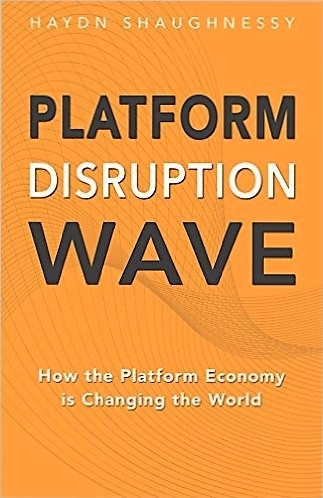Alibaba eclipse: What Harvard Business Review shouldn't teach you about disruption

Harvard Business Review ran a few articles in April 2016 about platforms and their revolutionary capacity. It is great to have more voices talking about platforms. But it is also worth having at least one additional opinion because I think the HBR is taking a wrong turn.
My daughter tells me I should be more relatable, by which she means stop picking fights. However, when it's your way of life how can you stop? But to be relatable for one minute. Do you ever sense what you read about in business and technology is kind of right but not quite; that you want to agree and heck, align, but find it hard to pull off?
I'm like that with the latest debate around disruption. That's why I wrote a book about it; Platform Disruption Wave (coming soon and under $5.00 for the cheapskates – relatable, right?).
The crux of it is this. There is an argument, let's call it the consensus, that says platforms are disruptive because they create two-sided markets and network effects.

If you've read this far you will be familiar with those terms. For those who aren't... Network effects happen when you have a product like a phone. If I have one it is useless unless you have one. And because we're not married the chances are we will want other people to have phones too.
By being compelled to advocate phones because they are useless on their own, we create not just a network effect but a viral effect (remember that word! Advertising 101, circa 1998?). The "viral" is simply that we have to advocate the phone to make it useful to us.
Folks who argue for network effects say Uber and Airbnb benefit from them. This is plain wrong. I can happily see you rent your spare room out while keeping mine fresh for when the kids visit. You can give people lifts for Uber's dimes but I don't have to. There is no compulsion working in these examples to make me join in or to increase your satisfaction by my actions. We are not viral.
That has led to the development of the two-sided market argument (early on an adaptation of some interesting price theory that a French genius got a Nobel Prize for). The two-sided market argument in the consensus view though is network effects diluted. Water into Ribena.
Two-sided market arguments say, well, the platform exists to bring two-sides to a market together. But that sounds like my local Saturday market. The council has land it rents out to traders and it runs extra buses on a Saturday morning. One market, two sides.
There is validity in the two-sided market model in that an ecosystem on both sides will become advocates for the market, if the market functions well. It gives strong word-of-mouth (Advertising 101 circa 2005).
But heck, we need to be bolder about these arguments... I mean debates.
The new platform is a service platform. This is the App Store or the Alibaba platform or Uber or Airbnb or Indeed Google; the ones that enable third party asset leverage. But it is many more platforms too.
The error of the two-sided market argument is to believe that all these companies brought, say, apps developers and app buyers together as part of a planned strategy that panned out really well.
Fact is Apple wanted nothing to do with app developers on its iPhone and had to be coerced into letting them in. Google has an ecosystem around search engine optimisers and marketers that for the first five years of its life it had to fight tooth and nail in order to keep some sanity in search engine results.
Platforms can function with dysfunctional relationships, groups who never communicate, and with the utmost reluctance. At base, they are a way for a smart guys to leverage the assets of other people, and in a time of very poor asset returns, that's a damn fine idea.
In Platform Disruption Wave I have tried to weave together a narrative about this. About how platforms evolved and how disruption changed. The narrative includes TVs and flat panels, music and movement, smartphones, and, god help us, advertising and search. In all these cases an industry disruption was part of a much wider, broader, bigger wave.
My argument in the book is complicated but it can be summarised simply:
Disruption happens in waves that encompass (a) the breakdown of vertical market structures into horizontal activities and (b) as a result, reward substantial innovation in the organisation of wealth creating activity.
So organisational form - new operating models, become more important than new products.
It also says:
Disruption is always nested in an experimental period where entrepreneurs test hypotheses through public dialogue; where they collectively sense the ability of their ideas to meet new needs; and where they search for a fit with emerging technology infrastructures. The experimental period creates the ecosystems that break down industry barriers and establish the need for a new organizational form.
And finally:
The wave is increasingly tied to a geopolitical transition, in this case from the US to China, and is often specific to its own era, so we are now experiencing our wave of change, not the wave that swamped the world between 1973 and 2000. The current wave is driven by scale, or our new capacity for infinite endpoint management. Because disruption now favors scale then it will favor China.
Now, that is a summary rather than the two hundred pages it takes me to explain properly. But look at it this way: platforms are not two-sided markets. Nor are they shiny new enterprises.
They are a way to leverage third party assets at scale and nowhere has idle but eager assets like China has. They are the primary means for the transfer of economic power from the US to China. Watch out Cambridge.
© Copyright IBTimes 2025. All rights reserved.






















